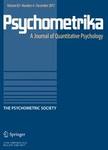版权所有:内蒙古大学图书馆 技术提供:维普资讯• 智图
内蒙古自治区呼和浩特市赛罕区大学西街235号 邮编: 010021

作者机构:McGill Univ Dept Psychol Montreal PQ H3A 1B1 Canada Penn State Univ University Pk PA 16802 USA McGill Univ Montreal PQ H3A 2T5 Canada
出 版 物:《PSYCHOMETRIKA》 (心理测量学)
年 卷 期:2007年第72卷第2期
页 面:181-198页
核心收录:
学科分类:0402[教育学-心理学(可授教育学、理学学位)] 04[教育学] 0701[理学-数学]
基 金:Natural Sciences and Engineering Research Council of Canada
主 题:generalized structured component analysis fuzzy clustering respondent heterogeneity alternating least squares latent curve models alcohol use
摘 要:Generalized Structured Component Analysis (GSCA) was recently introduced by Hwang and Takane (2004) as a component-based approach to path analysis with latent variables. The parameters of GSCA are estimated by pooling data across respondents under the implicit assumption that they all come from a single, homogenous group. However, as has been empirically demonstrated by various researchers across a number of areas of inquiry, such aggregate analyses can often mask the true structure in data when respondent heterogeneity is present. In this paper, GSCA is generalized to a fuzzy clustering framework so as to account for potential group-level respondent heterogeneity. An alternating least-squares procedure is developed and technically described for parameter estimation. A small-scale Monte Carlo study involving synthetic data is carried out to compare the performance between the proposed method and an extant approach. In addition, an empirical application concerning alcohol use among adolescents from US northwestern urban areas is presented to illustrate the usefulness of the proposed method. Finally, a number of directions for future research are provided.